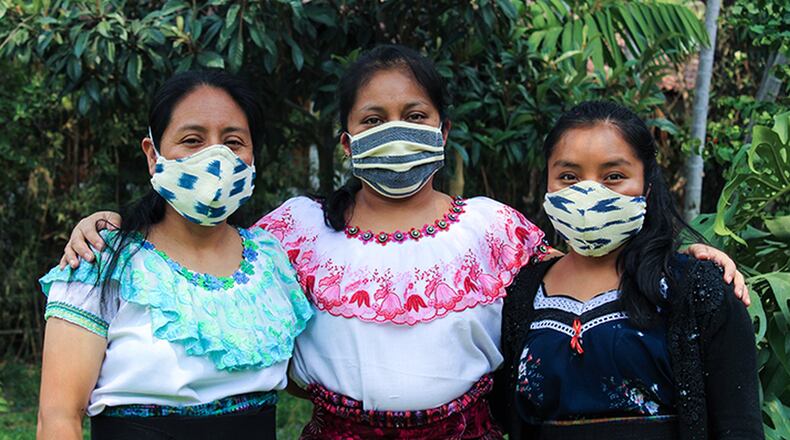>>Dayton region has highest coronavirus spread rate in Ohio, new numbers show
Dr. Kate Conway, assistant professor of family medicine at the Boonshoft School of Medicine at Wright State University, has visited Mercado Global’s cooperatives in Guatemala almost every year since 2008 to provide guidance on health curriculum. Now she and her fellow medical professionals at Wright State are benefiting from the masks.
Mercado Global has shipped 4,500 masks to hospitals, health care and emergency management organizations in Ohio, including Wright State University.
“Thank you artisans of Mercado Global for giving your talent and skill toward keeping me and my patients safe during this pandemic,” Conway said. “I am deeply grateful and look forward to when I can return to Guatemala and say gracias in person.”
Being part of Mercado is beneficial to the women, Conway said. One of the benefits is the education program that includes finance courses, women empowerment programs and a huge component involving a health curriculum, which is the area Conway and a partner from the Cleveland Clinic have worked on for years.
“I was set to take (Boonshoft) medical students with me in March and this was going to be my first time getting to take medical students to the site and I was super excited, we had done all this planning,” Conway said. “But we had to cancel our trip due to COVID-19.”
Though disappointed that her students would need to wait until next time to make the trip with her, Conway stayed in touch with the women in Guatemala throughout the crisis. The women in the Mercado program told her they were shifting their focus from making artisan bags to instead make masks for health care workers in the U.S.
“Here’s this organization that technically I have been serving for how many years and now they are totally pivoting and serving us,” Conway said. “These women are just wonderful, lovely — we’re invited into their homes and completely humbled by what they have to work with and what they do for their families.”
>>Glen Helen agreement reached, nature preserve to reopen
One mask, with an interchangeable filter and metal nose guard, is designed for health care workers who are not incubating or performing surgeries. The other is a simpler version that’s being sold to consumers online and wholesale to boutiques and corporate partners, according to the Food For The Poor release.
For every mask purchased, another is donated to those working on the front lines of the coronavirus pandemic. In addition to the masks donated to hospitals, several companies have ordered masks from the women for their own essential staff.
Through mid-June, Mercado Global plans to ship another 8,000 masks to hospitals in Ohio, California, Massachusetts and Vermont, plus 19,000 to New York City postal service workers and housing authority workers, 10,000 to nonprofits serving HIV and immune-compromised populations and 2,500 to migrant farm workers in California.
About the Author


